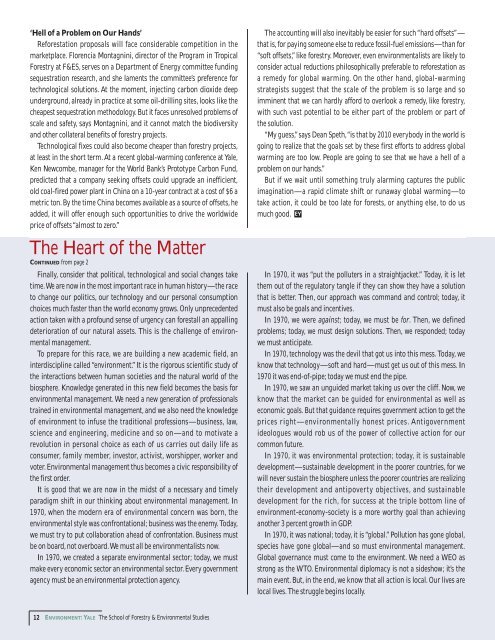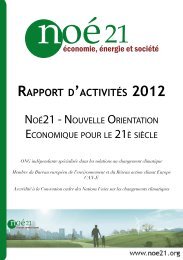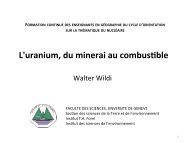As a Remedy to Global Warming, As a Remedy to Global Warming
As a Remedy to Global Warming, As a Remedy to Global Warming
As a Remedy to Global Warming, As a Remedy to Global Warming
Create successful ePaper yourself
Turn your PDF publications into a flip-book with our unique Google optimized e-Paper software.
‘Hell of a Problem on Our Hands’Reforestation proposals will face considerable competition in themarketplace. Florencia Montagnini, direc<strong>to</strong>r of the Program in TropicalForestry at F&ES, serves on a Department of Energy committee fundingsequestration research, and she laments the committee’s preference fortechnological solutions. At the moment, injecting carbon dioxide deepunderground, already in practice at some oil-drilling sites, looks like thecheapest sequestration methodology. But it faces unresolved problems ofscale and safety, says Montagnini, and it cannot match the biodiversityand other collateral benefits of forestry projects.Technological fixes could also become cheaper than forestry projects,at least in the short term. At a recent global-warming conference at Yale,Ken Newcombe, manager for the World Bank’s Pro<strong>to</strong>type Carbon Fund,predicted that a company seeking offsets could upgrade an inefficient,old coal-fired power plant in China on a 10-year contract at a cost of $6 ametric <strong>to</strong>n. By the time China becomes available as a source of offsets, headded, it will offer enough such opportunities <strong>to</strong> drive the worldwideprice of offsets “almost <strong>to</strong> zero.”The Heart of the MatterCONTINUED from page 2Finally, consider that political, technological and social changes taketime.We are now in the most important race in human his<strong>to</strong>ry—the race<strong>to</strong> change our politics, our technology and our personal consumptionchoices much faster than the world economy grows. Only unprecedentedaction taken with a profound sense of urgency can forestall an appallingdeterioration of our natural assets. This is the challenge of environmentalmanagement.To prepare for this race, we are building a new academic field, aninterdiscipline called “environment.” It is the rigorous scientific study ofthe interactions between human societies and the natural world of thebiosphere. Knowledge generated in this new field becomes the basis forenvironmental management. We need a new generation of professionalstrained in environmental management, and we also need the knowledgeof environment <strong>to</strong> infuse the traditional professions—business, law,science and engineering, medicine and so on—and <strong>to</strong> motivate arevolution in personal choice as each of us carries out daily life asconsumer, family member, inves<strong>to</strong>r, activist, worshipper, worker andvoter. Environmental management thus becomes a civic responsibility ofthe first order.It is good that we are now in the midst of a necessary and timelyparadigm shift in our thinking about environmental management. In1970, when the modern era of environmental concern was born, theenvironmental style was confrontational; business was the enemy. Today,we must try <strong>to</strong> put collaboration ahead of confrontation. Business mustbe on board, not overboard.We must all be environmentalists now.In 1970, we created a separate environmental sec<strong>to</strong>r; <strong>to</strong>day, we mustmake every economic sec<strong>to</strong>r an environmental sec<strong>to</strong>r. Every governmentagency must be an environmental protection agency.The accounting will also inevitably be easier for such “hard offsets”—that is, for paying someone else <strong>to</strong> reduce fossil-fuel emissions—than for“soft offsets,” like forestry. Moreover, even environmentalists are likely <strong>to</strong>consider actual reductions philosophically preferable <strong>to</strong> reforestation asa remedy for global warming. On the other hand, global-warmingstrategists suggest that the scale of the problem is so large and soimminent that we can hardly afford <strong>to</strong> overlook a remedy, like forestry,with such vast potential <strong>to</strong> be either part of the problem or part ofthe solution.“My guess,” says Dean Speth,“is that by 2010 everybody in the world isgoing <strong>to</strong> realize that the goals set by these first efforts <strong>to</strong> address globalwarming are <strong>to</strong>o low. People are going <strong>to</strong> see that we have a hell of aproblem on our hands.”But if we wait until something truly alarming captures the publicimagination—a rapid climate shift or runaway global warming—<strong>to</strong>take action, it could be <strong>to</strong>o late for forests, or anything else, <strong>to</strong> do usmuch good. EYIn 1970, it was “put the polluters in a straightjacket.” Today, it is letthem out of the regula<strong>to</strong>ry tangle if they can show they have a solutionthat is better. Then, our approach was command and control; <strong>to</strong>day, itmust also be goals and incentives.In 1970, we were against; <strong>to</strong>day,we must be for. Then, we definedproblems; <strong>to</strong>day, we must design solutions. Then, we responded; <strong>to</strong>daywe must anticipate.In 1970, technology was the devil that got us in<strong>to</strong> this mess. Today, weknow that technology—soft and hard—must get us out of this mess. In1970 it was end-of-pipe; <strong>to</strong>day we must end the pipe.In 1970, we saw an unguided market taking us over the cliff. Now, weknow that the market can be guided for environmental as well aseconomic goals. But that guidance requires government action <strong>to</strong> get theprices right—environmentally honest prices. Antigovernmentideologues would rob us of the power of collective action for ourcommon future.In 1970, it was environmental protection; <strong>to</strong>day, it is sustainabledevelopment—sustainable development in the poorer countries, for wewill never sustain the biosphere unless the poorer countries are realizingtheir development and antipoverty objectives, and sustainabledevelopment for the rich, for success at the triple bot<strong>to</strong>m line ofenvironment-economy-society is a more worthy goal than achievinganother 3 percent growth in GDP.In 1970, it was national; <strong>to</strong>day, it is “global.” Pollution has gone global,species have gone global—and so must environmental management.<strong>Global</strong> governance must come <strong>to</strong> the environment. We need a WEO asstrong as the WTO. Environmental diplomacy is not a sideshow; it’s themain event. But, in the end, we know that all action is local. Our lives arelocal lives. The struggle begins locally.12ENVIRONMENT:YALE The School of Forestry & Environmental Studies








